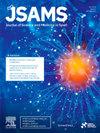运动对女性睡眠质量的影响——一项系统回顾和荟萃分析。
IF 3
2区 医学
Q1 SPORT SCIENCES
引用次数: 0
摘要
目的:失眠症影响着全球至少三分之一的人口,并且在女性中更为常见。据报道,运动可以改善睡眠质量和随后使用的催眠药。因此,我们进行了一项荟萃分析来评估运动对成年女性睡眠质量的影响。设计:本荟萃分析采用随机效应模型系统评估运动对女性睡眠质量的影响。方法:我们检索了7个数据库的随机对照试验,以检验运动对女性睡眠质量的影响。纳入标准为18岁及以上有失眠症状的女性,以运动作为干预措施,以匹兹堡睡眠质量指数或失眠严重程度指数作为结果测量。我们排除了使用其他治疗方法的研究,那些涉及癌症患者或孕妇的研究,以及那些数据不明确、无法分析的研究。meta分析采用随机效应模型,结果以加权平均差和95% %置信区间表示。采用Cochrane手册标准评估偏倚风险。结果:meta分析包括16项研究。结果表明,运动显著降低了匹兹堡睡眠质量指数的总分。结论:通过匹兹堡睡眠质量指数测量,运动训练可以显著改善成年女性的睡眠质量。因此,运动对促进健康至关重要,尤其是作为一种非药物治疗。当将来有更多的研究可用时,将有可能进一步探索年龄,运动类型和运动时间的影响。本文章由计算机程序翻译,如有差异,请以英文原文为准。
Effects of exercise on sleep quality in women — A systematic review and meta-analysis
Objectives
Insomnia affects at least one-third of the global population and is more common in women. Exercise has been reported to improve sleep quality and subsequent use of hypnotics. Therefore, we performed a meta-analysis to assess the effect of exercise on sleep quality in adult women.
Design
This meta-analysis systematically assessed the effects of exercise on women's sleep quality using a random-effects model.
Methods
We searched seven databases for randomised controlled trials examining the effect of exercise on sleep quality in women. Inclusion criteria were women aged 18 or older with insomnia symptoms, exercise used as an intervention, and the Pittsburgh Sleep Quality Index or Insomnia Severity Index as outcome measures. We excluded studies using other treatments, those involving cancer patients or pregnant women, and those with unclear, unanalysable data. A random-effects model was used for meta-analysis, with outcomes expressed as the weighted mean difference and 95 % confidence interval. Risk of bias was assessed using Cochrane Handbook criteria.
Results
The meta-analysis included 16 studies. The results indicated that exercise significantly reduced the Pittsburgh Sleep Quality Index total score. Exercise implemented for < 12 weeks was more effective in improving sleep quality and daytime dysfunction, whilst interventions ≥ 12 weeks reduced the use of sleep medication.
Conclusions
Exercise training can significantly improve sleep quality in adult women, as measured by the Pittsburgh Sleep Quality Index. Therefore, exercise can be crucial in promoting health, especially as a non-pharmacological treatment. When more studies will be available in the future, it will be possible to further explore the impact of age, type of exercise, and time of exercise.
求助全文
通过发布文献求助,成功后即可免费获取论文全文。
去求助
来源期刊
CiteScore
7.40
自引率
10.00%
发文量
198
审稿时长
48 days
期刊介绍:
The Journal of Science and Medicine in Sport is the official journal of Sports Medicine Australia (SMA) and is an an international refereed research publication covering all aspects of sport science and medicine.
The Journal considers for publication Original research and Review papers in the sub-disciplines relating generally to the broad sports medicine and sports science fields: sports medicine, sports injury (including injury epidemiology and injury prevention), physiotherapy, podiatry, physical activity and health, sports science, biomechanics, exercise physiology, motor control and learning, sport and exercise psychology, sports nutrition, public health (as relevant to sport and exercise), and rehabilitation and injury management. Manuscripts with an interdisciplinary perspective with specific applications to sport and exercise and its interaction with health will also be considered.

 求助内容:
求助内容: 应助结果提醒方式:
应助结果提醒方式:


